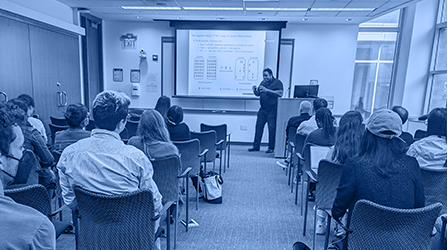Dr. Yong Chen’s Study on Long COVID in Children Named a 2026 Top 10 Clinical Research Achievement
Congratulations to Dr. Yong Chen on his RECOVER-EHR study being named a 2026 Top 10 Clinical Research Achievement.
Unlocking insights from complex data to advance biomedical research and education and to improve population health.

In the data-rich world of biomedical research, biomedical data science plays a key role in knowledge discovery-to devise and validate new clinical strategies for managing and treating disease-and biostatistics is central to this enterprise.
As experts in inferential thinking, biostatisticians’ work enables the global scientific community to unlock new knowledge and population insights from sampled data. Our unique understanding of randomness and variability positions us to lead experimental design and build models that can account for design-induced systematic biases; handle structures inherent to complex data; adjust for multiplicities that could produce false discoveries; and rigorously assess causal inference for observational data.
Our research is inherently collaborative. We work across labs, divisions, and departments to promote sound experimental design, analytical procedures, and reproducible research to address complex biomedical challenges.
Deputy Director, Biostatistics
Professor of Biostatistics
Deputy Director, Biostatistics
Professor of Biostatistics
Associate Director, Biostatistics
Executive Assistant to Dr. Jeffrey Morris (Biostatistics)
Stay informed with the latest research findings, news, and events from our division.
Congratulations to Dr. Yong Chen on his RECOVER-EHR study being named a 2026 Top 10 Clinical Research Achievement.
Jeffrey S. Morris, PhD, analyzes the U.S. vaccine safety monitoring system and suggests improvements in a new APPC white paper.
Congratulations to Drs. Jason D. Christie and James P. Guevara on their election as Fellows of the College of Physicians of Philadelphia, recognizing their impactful contributions to medicine and public health.
Nandita Mitra, PhD, was honored with two 2025 Penn Medicine Awards of Excellence for her outstanding contributions to research and education.
Associate Professor of Biostatistics
Alisa Stephens Shields, PhD, Associate Professor of Biostatistics, is recognized for her collaboration and impactful leadership in the realms of health, statistical education, and inclusion in the field. Her research focuses on extensions and innovative applications of causal inference approaches to enhance the design and analysis of clinical trials, as well as the development of patient-reported outcomes to inform population-appropriate trial endpoints. In this Q&A, Dr. Stephens Shields touches on her experiences in the DBEI research community, advice for students and early-career biostatisticians, and her recent 2024 Myrto Lefkopoulou Distinguished Lectureship from Harvard University.
Read Q&A